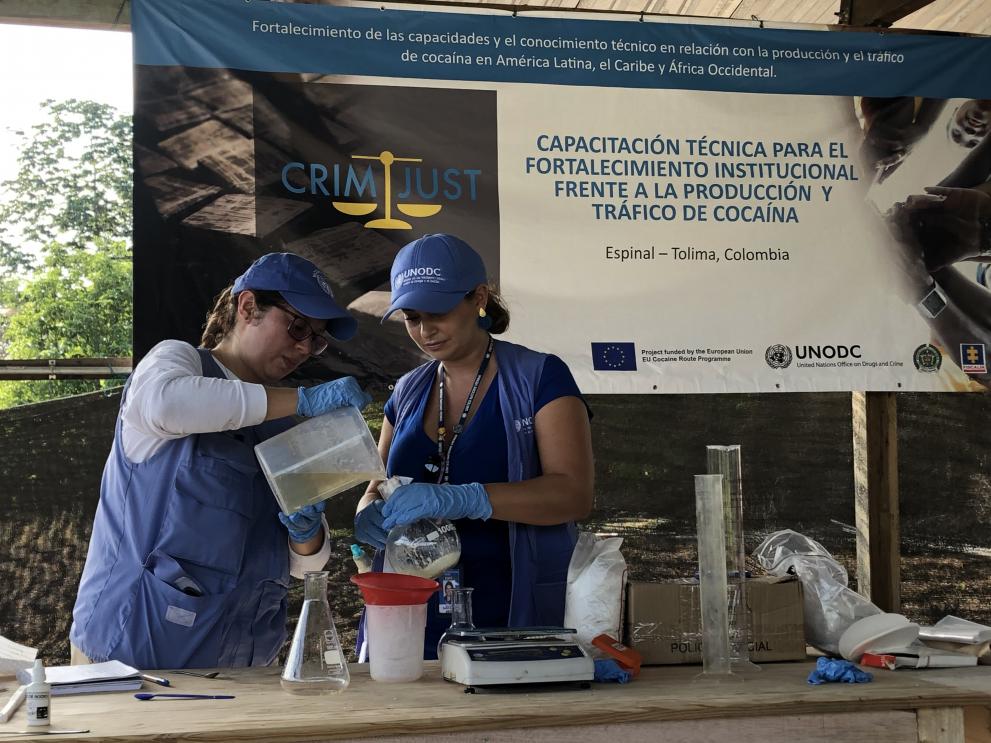
Close to 40% of criminal groups active on the EU territory are involved in the illegal trade of drugs according to the 2021 Europol Serious Organized Crime Threat Assessment (SOCTA). Increasingly harmful organised crime groups are expanding their power and influence beyond national borders. This destabilizes entire regions, especially along trafficking routes, and impoverishes local communities, hampering a sustainable economic development and business opportunities. At the same time, it affects security within the EU as well.
For the past ten years, the European Union has supported the cooperation and networking of law enforcement and criminal justice officials globally to enable them to communicate easier through secure channels and tackle organised crime more efficiently.
The EU’s Global Illicit Flows Programme focuses on trans-regional routes where illicit goods typically move across borders - for example by bringing together counter-narcotics officials along the so-called cocaine and heroin routes. As these officials learn to work together, when they need information or support in their criminal investigations, they can count on each other’s rapid support.
Projects such as CRIMJUST have, since 2019, brought together senior investigators and prosecutors from 21 countries across the Atlantic in 23 Inter-regional Investigative fora. These helped to build trust between investigative teams and develop joint investigative actions which resulted in major drug seizures. Over 14 000 investigators, of which about 20% women were trained to date.
In order to reinforce the border controls and better equip national authorities, the EU, through the SEACOP and AIRCOP projects, has helped create multi-agency units at ports and seaports, putting together officers from various relevant agencies with a counter-narcotic mandate: police, border guards, coast guards, gendarmerie, customs.
Also, the EU-funded COLIBRI project recently developed a geoportal to monitor and register trafficking incidents via business and leisure planes and help law enforcement authorities track more easily the criminal networks. Inter-agency units have been also given access to trans-regional secure communication channels and have been trained to understand better concealment areas on vessels, or to profile travellers and cargo better in order to identify illegal trafficking.
Thanks to this better cooperation, officers have seized more illicit goods – first and foremost drugs, but also arms, pangolin scales or stolen cars.
Over the past 10 years, these EU-funded projects have delivered major results, helping to seize:
- 79 tons of cocaine, 11 tons of heroin, 65 tons of cannabis;
- 20 tons of fake medical products;
- 3.5 tons of methamphetamines and new psychoactive substances
- €25 million in cash
- close to 2 tons of pangolin scales
- and contributed to the arrest of approximately 8 100 trafficking suspects and 9 potential foreign terrorist fighters.
Improving intelligence sharing and border controls makes fighting organised crime more efficient and it improves our security in Europe.
But disrupting the supply of drugs is only one side of the coin. The EU-ACT project has additionally focused on reducing demand and harm caused by drug abuse by piloting rehabilitation programs in prisons.
All these actions are in line with the EU Drugs Strategy 2021-2025 and the EU Strategy to tackle Organised Crime 2021-2025.
Details
- Publication date
- 25 June 2021
